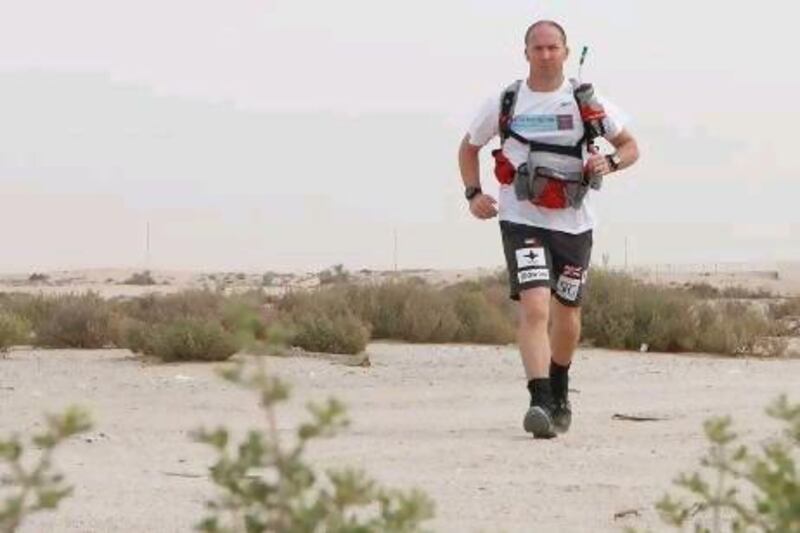DUBAI // Running 72 kilometres uphill would be a terrifying prospect for most people. Doing it with 16 kilograms strapped to your back for 12 hours verges on the superhuman.
But Jim McIntosh, 34 and a former paratrooper, has some powerful incentives to help him stay the course - friends who were injured in Iraq and Afghanistan.
The father-of-two began his gruelling challenge today at 1.30am at the Wadi Bih run in Ras Al Khaimah. His efforts will raise funds for the wounded colleagues of his former British army regiment.
"You never leave the regiment. You're always still with those still serving and working in the same environment," said Mr McIntosh, who left the army seven years ago. "There's guilt. Some of my friends were killed or injured and this is one way to help out some friends. When I'm living in Dubai having a cracking lifestyle, and these guys are out there living hell, running 12 hours doesn't feel so hard. It puts it all into perspective."
The route starts in Dibba and goes up 900 metres above sea level along asphalt and gravel roads through the Hajar Mountains.
The majority of runners take the challenge in teams of five, with each runner completing about 15km for a distance of about 72km. Each team must have one woman competing. After runners finish their stage, they get into a 4x4 as it continues to the next leg to drop off a fresh pair of legs.
The challenge will not be the first time Mr McIntosh has tackled Wadi Bih. Two years ago he ran the race in 12 hours 45 minutes.
He believes he was the first to do the run solo and unsupported; he carried his own water. Today his goal is to finish in under 12 hours.
Mr McIntosh has also run the Marathon des Sables in Morocco. It took him seven days to complete the 243km race, the equivalent of five-and-a-half marathons.
This year's training schedule included the Dubai Marathon, which he finished in four hours and 21 minutes.
"It was a steady plod because I didn't want to injure myself," he said. He completed the race in his army boots and carried 16kg.
"It's the standard fitness weight in the British army and a lot of soldiers in the army do it. It's an unwritten rule that it's the weight you carry. Everyone does it," he said.
He runs a minimum of 10k every day, whether training or not. "For a bad week I do 50, 60km and a good week I'll do about 80km."
Catriona Ryan is participating with a team and plans to start the race at 6am. "We don't want to start too late so we will be the last over the line. It's a long day. Between the run, everyone will be together for 70km and we will have to keep stocked up on food and water in the jeep," said the brand manager.
Ms Ryan, 31, heard about the race through friends. The run is an extension of her training sessions after the Dubai 10K two weeks ago.
"I spoke to my brother who does marathons and he knew about it and when it's on your doorstep why not do it," she said.
She and her teammates - three other women and a man -will split the race into 13 sections. They studied the gradient of the course and everyone will have his or her fair share of hills to run.
By 3pm most of the 200 teams and 50 solo runners are expected to have crossed the finish line. The fastest single competitor is expected to do the race in six hours.
"It's a tough run and they have their teammates to think of and make sure not to let them down," said John Young, the event organiser. "They're maybe doing just 15k, which isn't massive, but over short bursts, it can get very tiring."






